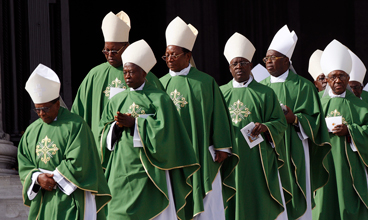by John Thavis

VATICAN CITY (CNS) – Pope Benedict XVI asked for prayers for his trip to Benin and for those suffering from violence on the African continent.
The pope, addressing pilgrims at his noon blessing Nov. 13, said he was traveling to Benin “in order to strengthen the faith and hope of Christians in Africa.”
“I entrust this trip and the inhabitants of this beloved continent to your prayers, especially those who experience insecurity and violence,” he said. He prayed that Mary give support to all those working for reconciliation in Africa.
During the Nov. 18-20 visit, the pope planned to unveil a document he wrote as a follow-up to the 2009 Synod of Bishops on Africa. The text synthesizes the synod’s conclusions and presents pastoral priorities for the church in Africa.
The pope said the whole point of the synod was to help make Christians “the salt of the earth and the light of the world.”
The Benin trip is Pope Benedict’s second apostolic visit to Africa. He visited Cameroon and Angola in 2009.
Benin is a small West African nation with little international influence. But its 150-year history of Christianity, its multi-ethnic and multifaith identity, and its struggles for social justice make the country an ideal platform for the pope’s message.
The trip features meetings with government leaders, a speech to non-Christian leaders and an encounter with children at a local parish. The 84-year-old pope will deliver 10 major talks at 16 events in Benin, spending most of his time in Cotonou, but also visiting the coastal city of Ouidah.
The centerpiece of the visit will be the pope’s consignment of his apostolic exhortation to the bishops of Africa during a Mass in Cotonou’s Friendship Stadium Nov. 20.
The 2009 special Synod of Bishops for Africa, which brought more than 200 bishops to Rome, focused on “the church in Africa in service to reconciliation, justice and peace.”
The assembly ended with calls for spiritual conversion and social reforms, appealing for a fairer global order and telling corrupt Catholic politicians in Africa to “repent or resign” in the name of the common good.
The synod’s conclusions were summarized in 57 propositions that were presented to the pope.
Pope Benedict has already indicated some of his priorities for the church in Africa. Closing the 2009 synod, he said that if the Church wants to change hearts and minds on the continent, it must itself be a model of unity with “no divisions based on ethnic, language or cultural groups.”
Benin’s more than 40 ethnic groups have lived in general harmony, but the country is not immune from occasional tension. Neither is the Catholic Church. Last spring, there was public opposition by some indigenous leaders when the pope named Archbishop Augustine Obiora Akubeze, a member of the Igbo ethnic group, to head the archdiocese of Benin City.
Church officials say Benin enjoys a climate of interreligious calm and cooperation. The country has escaped the violence that has frequently erupted between Christians and Muslims in neighboring Nigeria. Benin’s population of nearly nine million people is 42% Christian and 24% Muslim, with the rest divided between followers of voodoo practices and native religions.
